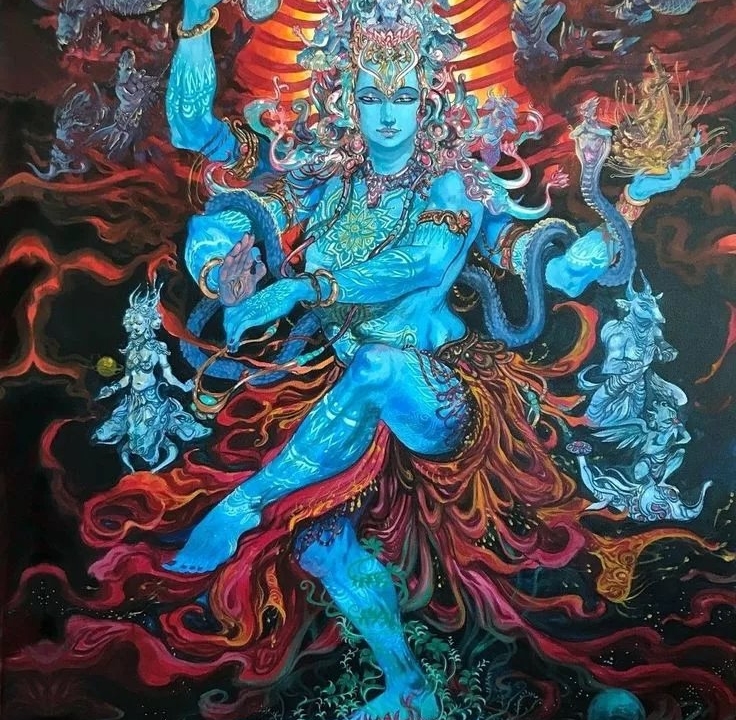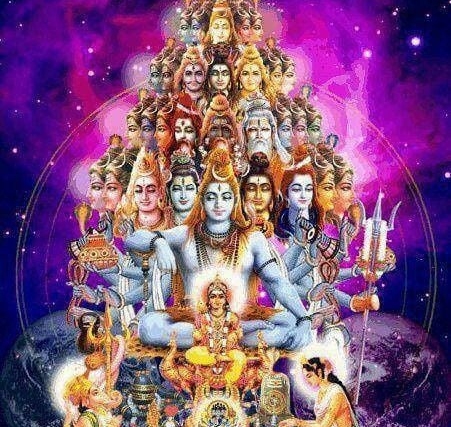Last week we read about the famous Kashmir Shaiva philosophy and this week we are going to narrate about another famous Shaiva philosophy prevailed in the Southern part of India, especially in Tamil Nadu. This Shaiva philosophy is generally known as Tamil Shaiva philosophy or dakshina Shaiva philosophy.
Thirumurai (holy division) is a twelve-volume compendium of songs or hymns in praise of Shiva written by various Shaiva saints in the Tamil language is considered as the preeminent Shaiva literature in Dakshina Shaivism. The Tirumantiram is a primary source for the system of Shaiva Siddhanta, being the tenth book of its canon.
Shaivism system of Kashmir is known as Trika-Shasana or Trika-Shastra or Rahasya-sampradaya. Whereas the Tamil Shaiva system is known as Mupporul (three subject) Shastra. This theology presents three universal realities: the pashu (individual Self), the pati (Lord Shiva), and the pasha (Self’s bondage) through ignorance, karma and maya.
The tradition teaches ethical living, service to the community and through one’s work, loving worship, yoga practice and discipline, continuous learning and self-knowledge as means for liberating the individual Self from bondage.
The goal of Saiva Siddhantam is to get rid of all impurities and attain the union of Pashu and Pati. Saiva Siddhantam does not consider God as the only eternal entity which is referred to as Pathi. Like God, souls or Pasu is also eternal that has neither beginning nor end. Souls are many and have their own limitations. Its capabilities are limited due to the bondage or Pasam. This is also eternal like God and souls. The soul is known as Pasu due to its nature of being under Pasam.
Pati is God, the Supreme Lord of all beings. Though it is not possible to comprehend His nature fully by the intellect, eight qualities are attributed to Siva: independence, purity, self-knowledge, and omniscience, freedom from mala (defilement), boundless benevolence, omnipotence, and bliss. Siva, in fact, is the home of all auspicious attributes.
It is true that the scriptures say that God is nir-guna. But this term does not mean that God is without attributes. It only means that he is not affected by the gunas of prakrti which is primal matter. He is above prakrti; and so sattva, rajas and tamas, the gunas of prakrti, are not his constituents, as they are of all finite entities. As Tirumular teaches, he is free from the three gunas (mukkuna-nirgunam).
Pasu which is the second category in Saiva-siddhanta means soul. Souls are by nature infinite, all-pervading and all-knowing. But because of association with impurities, malas, they become finite, limited and ignorant. The impurities, which are three in number constitute the pasas (bonds) of the soul, which are the third category in the Siddhanta. The three bonds are,
1. Anavam (ego),
2. Kanmam (karma) and
3. Mayaika (illusion).
Anavam creates ignorance and egoism to the souls. Karmam is giving experience to the souls. Maya helps the souls to get away from ignorance. Anava-mala is a connate impurity. It is that which atomizes, as it were, the infinite soul. Like Avidya in Advaita, Anava is a beginning less positive entity, blinding the soul’s vision.
The body is affected by three impurities. It is the source of the cosmos which includes world and all living entities. Anavam, Karmam and Mayai are inanimated. These elements are not capable of knowing anything even if it is taught. God and souls are animated. God as all knowing and souls, capable of knowing when taught.
According to Tamil Shaiva Siddhanta every soul in this universe should undergo in 3 phases of life. These phases are
1. Erul Nilam (Dark phase) or Tani Nilam (Sanskrit: Kevala Nila)
2. Marul Nilam (Bondage Phase) or Mayakka Nilam (Sanskrit: Sakala Nila)
3. Arul Nilam (Godly Phase) or Theli Nilam (Sanskrit: Shudha Nila)
The sakala-jiva is the full-fledged empirical soul, endowed with all the three malas. At the Kevala nila the soul as it exists in the state of cosmic dissolution. It is then free from maya-mala, the matrix of evolution. When there is fresh evolution, it becomes sakala again, being prompted by karma.
The vijnanakala is the soul which is conditioned only by anava-mala. Through spiritual disciplines it has risen above the spheres of karma and maya, and has arrived in the region of suddha-maya. Having reached here, it does not return to empirical existence. It has become mature and fit for the final operation of Siva’s grace. And, when this divine act takes place, anava too is removed, and the soul is released. The conditions of being of the three classes of souls are called, respectively, kevala-avastha, sakala-avastha, and suddha-avastha.
The soul’s progress is from pasa-jnana and pasu-jnana to pati-jnana. Step by step stage by stage, the soul proceeds from the domain of ignorance to the glorious heaven of wisdom. It has first to learn to equate empirical good and evil, merit and demerit. This is called iruvinaiyoppu.
Repetition of the sacred Siva-mantra, contemplation of the Holy of holies, with the consequent transformation of one’s life, and a benignant attitude towards the world, rid of all attachment and aversion, make one fit to receive the highest wisdom. Now, the anava-mala becomes mature and fit for the divine surgeon’s operation. God appears as Guru; and through grace he removes the scales that had hitherto blinded the soul’s vision. The soul, thenceforward, sees through the eye of God. It knows no longer through the pasas or through its pasu nature, but through Siva. This is Siva-jnana. The shower of grace (sakti-nipata) from God has made this possible. The soul is bathed in the eternal rays of God’s light, and it becomes totally washed of all its impurities. This is release.
The body may continue for a while longer because of the residue of prarabdha-karma. But that does not affect the perfection of the released soul. Such a one is a jivan-mukta. And when the body too falls, its momentum being spent, one attains videha-kaivalya. The spirit has escaped, once for all, from its cage; it can no longer be caught and bound.



